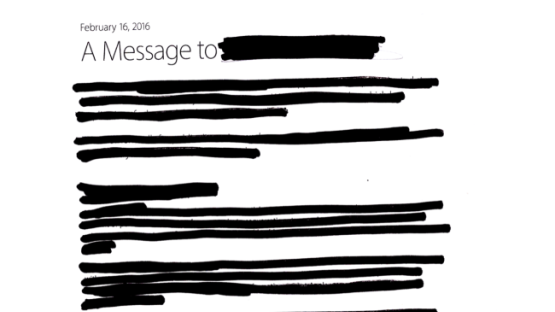Even this redacted letter wouldn't happen under the Investigatory Powers Bill

On Tuesday (16th February 2016) Apple posted a message to their customers stating that the company had been ordered by the FBI to “make a new version of the iPhone operating system, circumventing several important security features, and install it on an iPhone recovered during the investigation.” Apple are currently opposing this order. A fascinating debate is currently playing out in the media about whether Apple should comply with or resist the FBI's demands.
Whatever your views are of this demand, it is worth noting that if the Investigatory Powers Bill (IPB) was to become law, a telecommunications company receiving a similar demand from the UK Government would not be allowed to publish a letter like the one Apple has. They would be under a gagging order.
Under the IPB, Section 102(1)1 and 190(8) would prevent companies from disclosing such requests to their customers.
It would mean that the kind of public debate that the FBI/Apple case is prompting simply wouldn't happen. It might get decided behind closed doors that a device you use everyday, which stores all of your personal information, has been deliberately weakened by the company you bought it from – because the Government had ordered them to.
We urge the Home Office to rewrite the current draft IPB so that companies are not gagged from telling their customers that they have been forced to weaken the technology that they rely on everyday.



